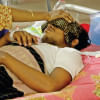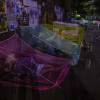Cox’s Bazar a new dengue hotspot

Cox's Bazar has become a hotspot for spreading dengue after Dhaka. Two dengue patients died and 103 patients were hospitalised with dengue in the district this year so far.
However, the number would be far more than that if members of the forcibly displaced Rohingya community -- who are currently in Bangladesh's shelter -- are included in the list.
Dr ATM Rezwanul Haque Bhuiyan, coordinator of the health sector under the Refugee Relief and Repatriation Commissioner, said the dengue outbreak in Rohingya camps in Cox's Bazar is much higher.
Two dengue patients died and 103 were hospitalised with dengue in the district this year so far.
According to data obtained from Rohingya camps, the number of dengue patients there was 3,029 till June this year, he mentioned.
According to the Directorate General of Health Service (DGHS), a total of 1,789 dengue patients were hospitalised this year till yesterday, of whom 254 were from outside Dhaka.
A total of three patients have died so far, of whom, two were in Cox's Bazar and one in Dhaka.
In 20 other districts, 151 dengue patients have been admitted to hospitals this year.
In Cox's Bazar, Rohingya camps at Ukhiya and Takenaf have been identified as the prime hot spots.
Civil Surgeon of Cox's Bazar Md Mahbubur Rahman told this newspaper that after Dhaka, the number of dengue patients is the second highest in Cox's Bazar, of whom, most are from forcibly displaced Rohingya community.
He said different combined activities have been going to control the spread of Aedes mosquitoes.
Dr Rezwanul said camp administration and NGOs are conducting anti-mosquito drives at the field level to control Aedes mosquitoes, following government guidelines.
Entomologist Manzur A Chowdhury said it was very important to conduct extensive drives within a 500 yards radius of case-positive households. However, that did not happen.
Manzur said the number of patients at Cox's Bazar is high due to the increasing number of tourists.
Entomologist of Jahangirnagar University Prof Kabirul Bashar echoed the same while emphasising identifying the hotspots and conducting extensive drives.
City corporations and residents should join hands in reducing the sources in areas with zero cases, he said.
Dr Md Ekramul Haque, deputy programme manager of the malaria and ATD control programme at DGHS, said they had conducted surveys at the Rohingya camps and held a meeting with stakeholders.
"During our pre-monsoon survey, we found 21.66 percent of Aedes Aegypti there which are not supposed to stay in rural areas. They mostly breed in urban areas," he said.
"It is very important to do vector control activities at the camps. There is a guideline of the government for every service provider organisation. Only stakeholders will be able to provide the service there following the guidelines," he added.

 For all latest news, follow The Daily Star's Google News channel.
For all latest news, follow The Daily Star's Google News channel. 








Comments